There might be affiliate links on this page, which means we get a small commission of anything you buy. As an Amazon Associate we earn from qualifying purchases. Please do your own research before making any online purchase.
A flower does not think of competing with the flower next to it. It just blooms.
Let me save you thousands of hours of therapy and the time it takes to read dozens of self-help books.
Stop comparing yourself with others.
Just stop it!
I am sure the idea of not comparing yourself with others is not entirely new to you. Likely you have heard it dozens or even hundreds of times.
Not comparing yourself to others has become a platitude. But it is a platitude because it is so true and so important.
Why is It Bad to Compare Yourself with Others?
Comparing yourself to others is one of the easiest ways to feel bad about yourself. You see what others are doing on social media, at work, and on television, and compare yourself unfavorably with these folks.
Everyone seems more accomplished and better looking, has a better job title and a nicer home, is more physically fit and wealthier, or just seems to be having a better time in their lives.
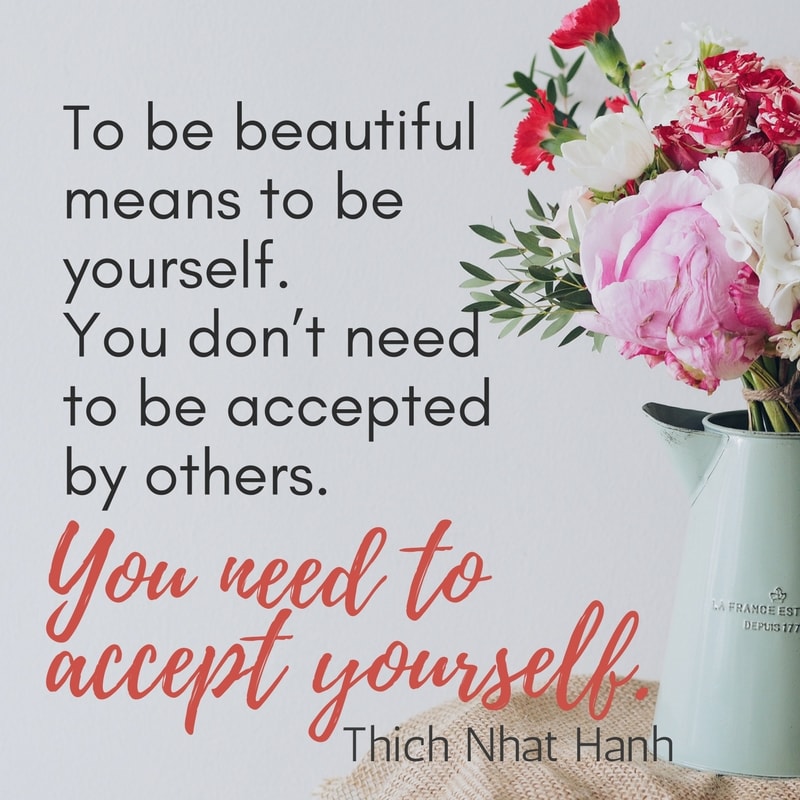
These negative comparisons are the path to unhappiness. They make you feel jealous, inadequate, and inferior. They cause you to make poor decisions. They cause you to feel greater stress, anxiety, and depression.
In short, making comparisons with others just sets you up for failure.
Where Comparisons Fail
Before we take a detailed look at how to stop comparing yourself to others, let’s take a look at why comparing yourself to others sucks.
You see the result, not the effort.
When you look at someone else’s success, you only see the result. You may be looking at years of effort, comparing your beginnings to their end.
To achieve the success you desire, you need to walk the road to success. It never helps to jump to the end and make comparisons to those who have arrived.
To better understand this, learn more about survivorship bias.
You are not them.
Comparing yourself to others means you compare what you see in others to what you know about yourself. Things always look better from the outside than they do from the inside.
People often put up a good front, making themselves look better to the world than they feel inside. You have no real idea about how they feel inside.
You are unique.
You are not the person you compare yourself to. Everyone has different strengths and different weaknesses. We are all special in our unique ways.
By comparing yourself to others, you are trying to take the things that make you special and unique and strip them away, comparing yourself to some mythical “norm.”
You waste time.
Comparing yourself to others takes time. Our time is limited. There are only so many hours in a day. Why worry about what others have or have done when you can be taking action to make improvements to yourself?
Life isn’t graded on a curve.
What others have done makes no difference in what you have, can, or will achieve. Your goal is not to be in the top 75% of some skill, but simply to be the best you can be.
Comparison kills the joy of achievement.
When you attempt new things, like habit changes, there is a joy that comes from your accomplishments. Let’s say you start a walking habit.
You may get a lot of joy from the first time you take 10,000 steps in a single day. Then you may take joy from 20,000 steps. Then you may start jogging and get achievement from running a mile, then a 5k, and eventually 5 miles. The list goes on….
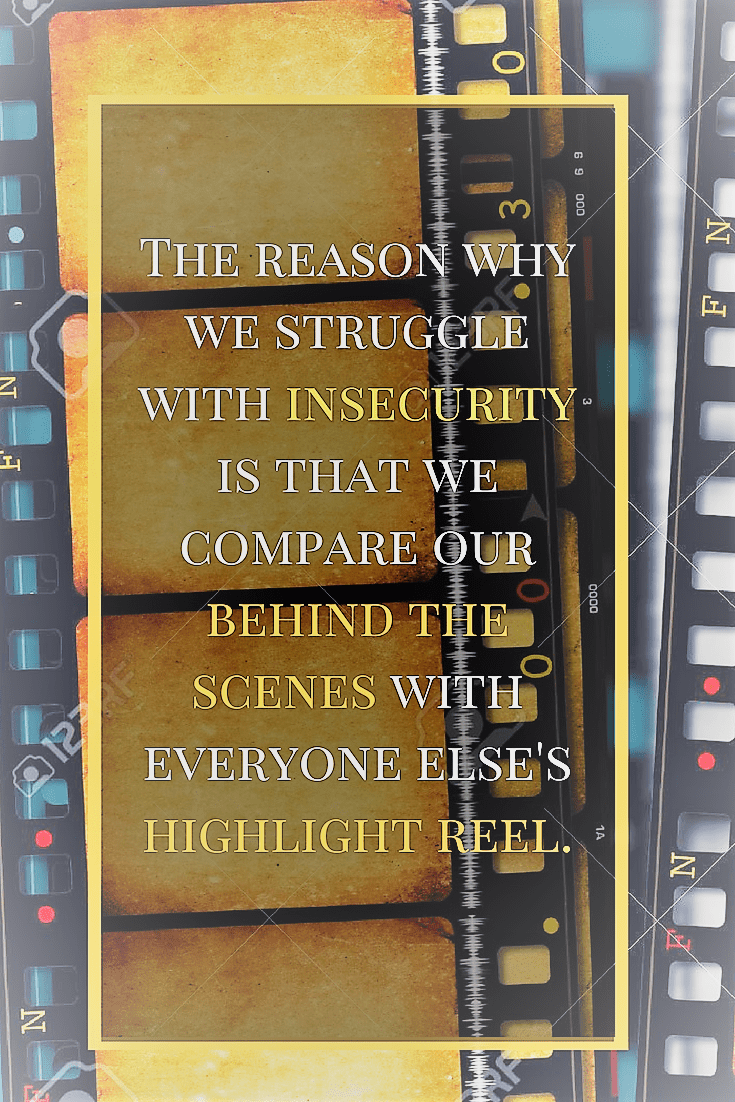
But if you initially compare yourself negatively to someone who runs marathons, you will always be behind, and get no joy from the very important milestones and achievements you could be making.
Comparison puts focus on the wrong person.
When you compare yourself to others, you focus on the other person—what they have done, what they have achieved, and what they do. But you have no control over this other person.
All you can control is you. And the only person you should be comparing yourself to is who you were previously. If you are improving, that is all that matters.
Hopefully, these seven reasons above drive home the message loud and clear: Don’t compare yourself to others.
But some things are easier said than done.
It is human nature to look at the lush greens of your neighbor’s beautifully manicured lawn and feel a twinge of jealousy when comparing it to your own weedy and dying lawn.
We may know intellectually that the “grass is always greener” next door, but that knowledge doesn’t always stop us from making these negative comparisons.
If you often feel jealous because it seems like everyone else is living an exciting, adventurous life, you’re probably dealing with a limiting belief commonly known as “fear of missing out” or FOMO. Watch the video below to learn how to reduce the fears about not having all of the experiences that other people have.
In this next section, we will dig in the weeds and see what we can learn about how to stop comparing ourselves to others.
Be a Unique Flower – How to Stop Comparing Yourself to Others
So you want to quit the jealousy, stress, anxiety, and unhappiness that come from comparing yourself unfavorably to other people—but maybe you don’t know how to do it. Here are some ideas to help you stop this negative habit.
1. Change Idealizing to Humanizing
It is easy to see that your boss, who is years younger than you, has a lot of money and a great career trajectory. Or you might see that your friend Kathy is a stunning beauty and that your friend Greg has an insane level of physical fitness.
It is easy to become jealous of these idealized versions of others. But these versions are never the complete picture. You need to take the complete picture and humanize these idealizations.
By doing this, you may realize that your boss is a workaholic. Your boss is constantly stressed and constantly working. He has no social life to speak of. Burgeoning health issues.
He may be successful but he is not happy.
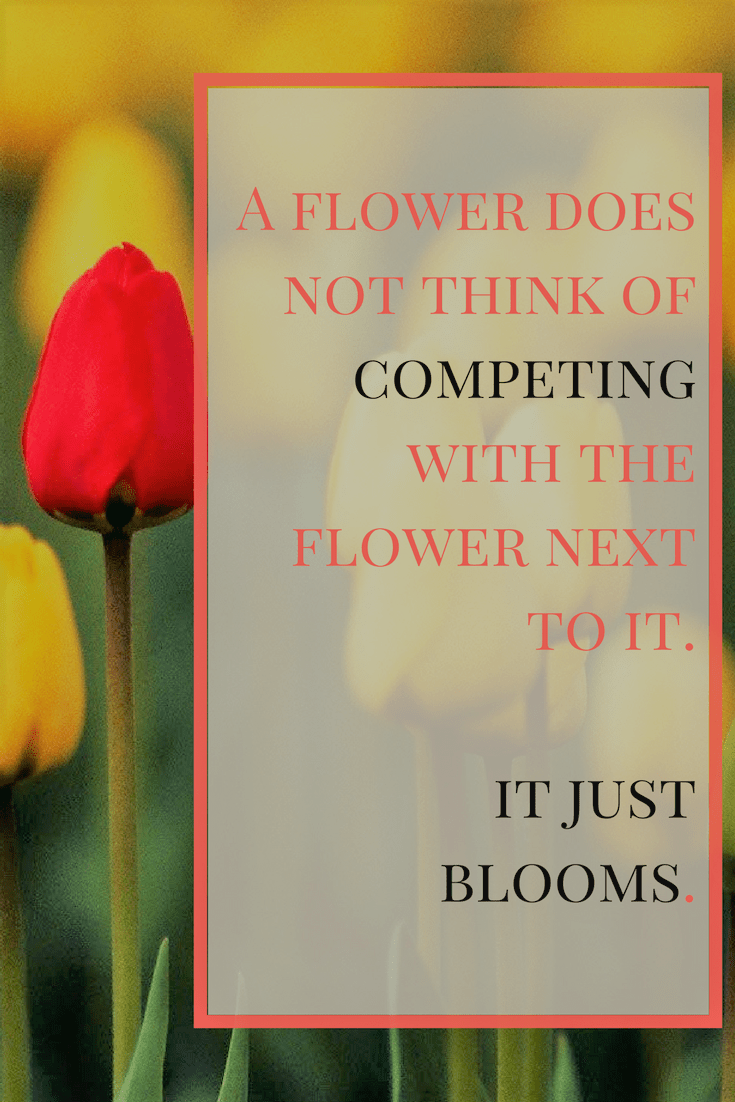
By humanizing your friend Kathy, you may see that she is a bundle of anxiety. She is beautiful but has low self-esteem. Her entire sense of self-being is locked up in the perception of her beauty.
Finally, you may humanize your friend, Greg. With a bit of analysis, you may see that yes, Greg is extremely fit and healthy, but the only thing that matters to him is his fitness. He has little drive to succeed, and his relationships are mostly shallow and meaningless.
Humanizing others is not about knocking them down, but about trying to get the complete picture. It is about seeing a balanced view of others, not the “perfect” view that may drive you mad with jealousy.
Realize others are human beings, and that they, like you, have strengths and weaknesses.
2. Accept Your Position
Before you can make any real change, you need to accept where you are, and move on at your pace. Don’t try to live some ideal of where you “should be.” Let’s give an example:
Maybe you had an exercise buddy five years previously. Due to “life,” you quit working out, but he kept going. Five years and 20 pounds later, you look at his physique and athletic attributes and feel jealous.
But this is unfair. Your old exercise buddy has worked hard for five years and is ahead of you. You can catch up, but you can only do so if you start over again from the position of a beginner—not from someone who has been working at it for five years.
Accept where you are, and only compare yourself to who you were last week.
3. Live Intentionally
In two of my recent books,10-Minute Mindfulness and Declutter Your Mind (both books co-authored by the inestimable Barrie Davenport), I talk extensively about the idea of intentional living.
In case you have not heard of intentional living, let me give you a brief description of the basics of this concept.
Intentional living is about making a conscious decision to live your life in alignment with your values, goals, dreams, and ethics. Intentional living is a roadmap to get to where you want to go in your life. A step-by-step guide is steering you from who you are to who you want to be.
People who live intentionally value life immensely—so much so that they don’t want life to just “happen.” They want to steer it with a purpose so that they can minimize mistakes and regrets and maximize the joys that life brings.
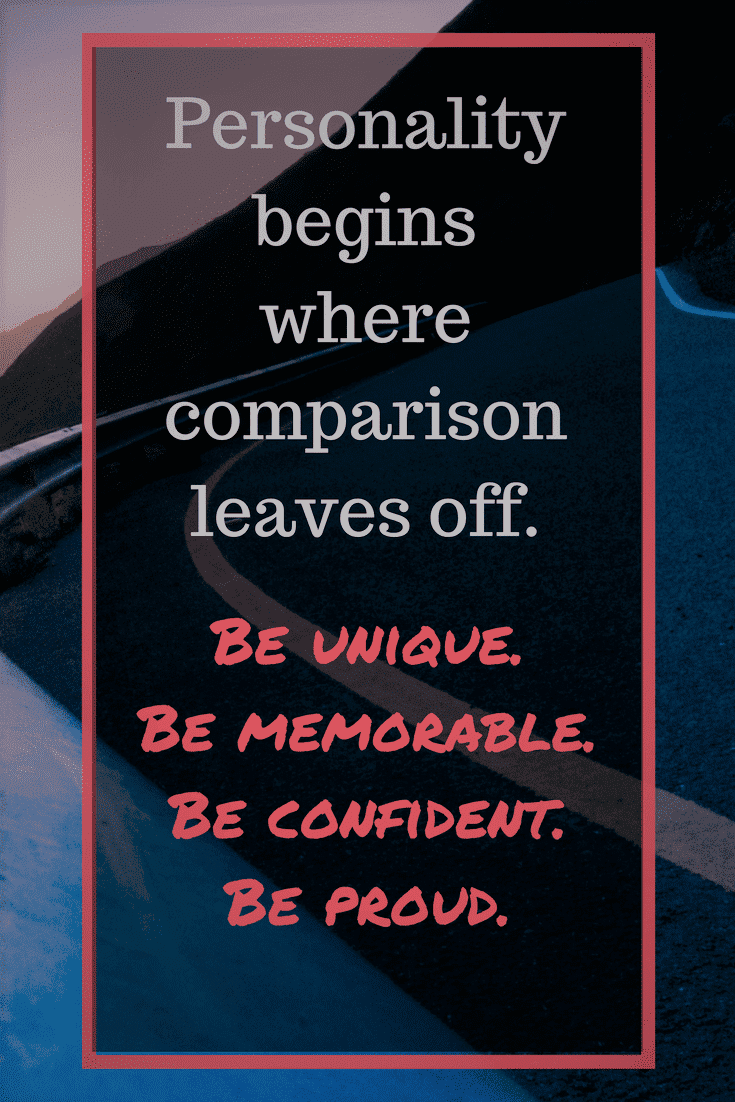
Sounds good, doesn’t it? It does to me, too!
One of the core concepts of intentional living is often “living in the moment”—enjoying what you have and can do right now, rather than putting things off.
This concept is incompatible with the idea of comparing yourself to others. You simply cannot enjoy living in the moment while you are also comparing yourself to others. It is impossible.
So next time you find yourself beginning to feel jealous of others, instead of making unfair comparisons, take the time and do something positive to yourself. Enjoy the moment and the success you have had instead.
4. Express Gratitude
Gratitude is an important concept that many people unfortunately overlook.
When you are grateful for the things you have achieved, you also acknowledge your successes.
Gratitude does double duty. It allows you to revel in your successes without being vain or self-centered, and it also allows you to give credit and gratitude to all the people who helped you along the way—because no one truly achieves anything of significant value without the support of others.
One of the best ways to express gratitude is by keeping a daily journal. (Check out our review of the Best Gratitude Journals HERE.)
At the beginning or end of every day, spend time thinking about your accomplishments. What are you proud about from the previous day? Who and what are you grateful for?
Taking this moment of reflection has shown to be one of the best tools for mental health, mental clarity, and happiness. It is hard to be depressed when you keep reminding yourself of all the good things you have in your life.
5. Realize Life Is not a Competition
Life is not something you can “win.” It is something to be enjoyed and savored. Many who are super successful in one aspect of life may be complete failures in other aspects.
Since life is not a game, you should stop competing. (This said, it's important to know the difference between healthy and unhealthy competition.) Don’t worry about how far ahead or behind others may be. Learn to work with others in harmony so that everyone gets what they desire from life.
6. If You Must Compare, Compare With Yourself
Comparing yourself to yourself is the only fair comparison you can make—and even this comparison has limits.
For example, it is unfair to compare yourself physically at 50 with yourself at 20, just like it would be unfair to compare the wisdom of your 20-year-old self with the wisdom of your 50-year-old self.
If you do compare yourself, only compare apples to apples—comparing yourself to a baseline version of yourself before you began trying to improve a specific habit.
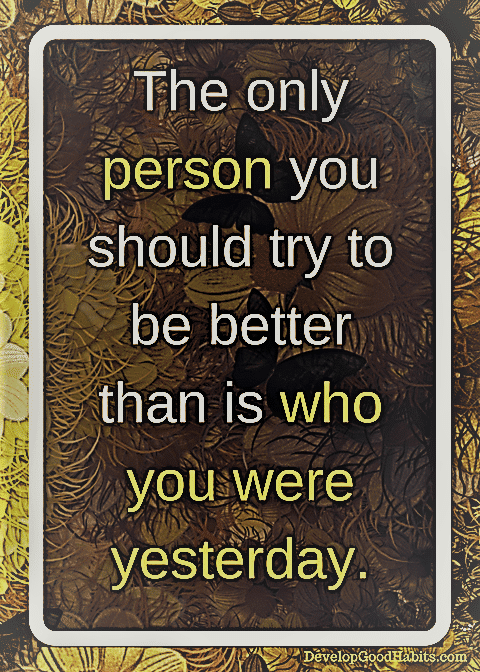
The idea here is to never belittle yourself, but to instead use the baseline version of yourself as a metric to measure against to ensure that you are improving and not staying static.
For example, compare yourself from a time before starting an exercise routine to a version of yourself after steadily exercising for six months.
Have you lost weight? Do you have more energy? Do you accomplish more? Are you happier?
These are all fair comparisons that focus on things that are measurable.
Final Thoughts on How to Stop Comparing Yourself to Others
Hopefully, this post has given you a few tools to help you get a better grasp on how to stop comparing yourself to others.
It is a natural human response to see the faces others present to the world and have some jealousy. But it is important to remember that the different faces people present are often not true.
You do not know what they have gone through. You are not a party to their internal monologue, which may be full of doubts and fears.
These comparisons are not only unfair, they are also unhealthy. Perhaps even more importantly, they do nothing to help you improve yourself and make important self-improvement changes in your life.
The only thing comparing yourself to others does is fill you full of doubt and insecurity. So stop it.
Just stop it!
And if you're looking for more interesting articles about personal growth, be sure to check out these blog posts:
- 9 Ways to Build a More Positive Self-Image of Yourself
- 15 Ways to Practice Humility Throughout Your Life
- 11 Steps to Stop Caring So Much About Everything


